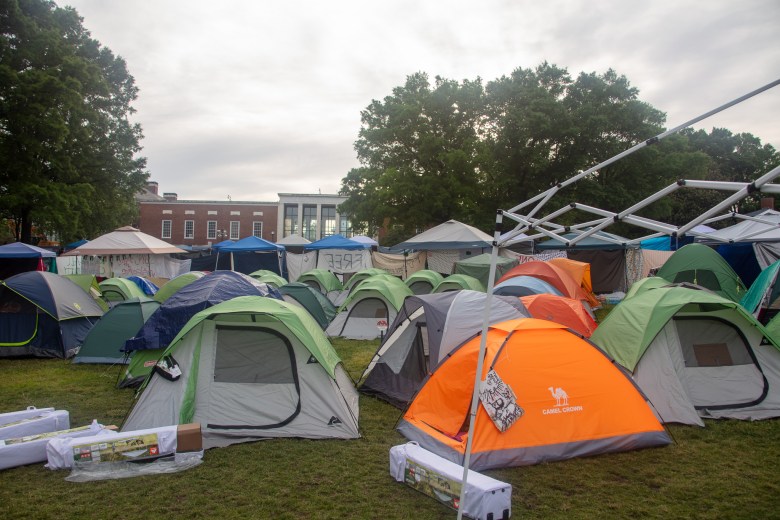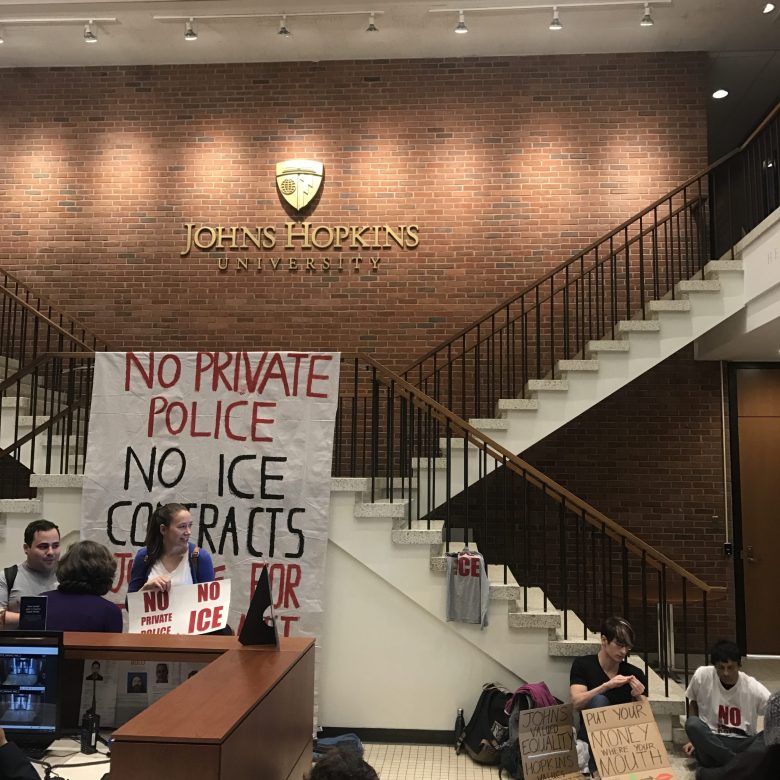Students, faculty and organizers are calling on the Baltimore City Council to exercise its new authority over the Baltimore Police Department to hold the first ever hearing on the Johns Hopkins University Police Department.
Unlike BPD, the public currently has no mechanism to hold JHPD accountable or even to have their questions about the department answered in a public forum, organizers said at a late April press conference in front of City Hall.
“Every opportunity to speak that the community has had to date has been organized by Hopkins, run by Hopkins, and controlled by Hopkins,” said Fiona Chamness of the Baltimore Abolition Movement, emphasizing that the push against JHPD is part of a broader fight for a new vision of public safety. “We want a neutral space where community voices are truly heard.”
Hopkins leadership maintains that the force is intended to ensure campus safety and notes community members can provide oversight and accountability through the Police Accountability Board. The university did not respond to a request for comment, but in a recent public statement, Branville G. Bard Jr., Hopkins’ vice president for public safety, said, “During my time at Hopkins, I have met with over 100 community and stakeholder groups, and I commit to continue our work with the community to shape the JHPD as a model, community-oriented, transparent, and constitutional public safety organization.”
But residents are concerned that federal political pressure could change that. As the Trump administration cracks down on universities and dissent nationwide, residents warn that Hopkins — a university that in fiscal year 2024 received more NIH funding than any other — is vulnerable to coercion.
Speakers at the April rally highlighted a chilling precedent: In May 2024, when faced with a peaceful student encampment at Johns Hopkins, the mayor rejected calls to clear the protest, citing the protesters’ right to assemble. Activists worry that a fully empowered private police force under Hopkins’ control would not.

“If they had their own police force, they wouldn’t have needed to ask,” said organizer Emil Volcheck.
“Hopkins doesn’t understand that protest is not a threat — it’s a right,” Volcheck said.
The timing to act is critical, organizers said. As of this year, Baltimore has regained local control over BPD for the first time since the Civil War. Yet Hopkins’ private force operates under a 2022 Memorandum of Understanding signed with BPD as an agency of Maryland — a body that no longer oversees local policing. Activists say a hearing would clarify how JHUPD’s authority differs from BPD’s and expose the lack of independent oversight over the university force.
The April 28 rally is the latest in the long-running opposition to JHPD. In 2019, students occupied Garland Hall for over a month, demanding Hopkins cancel its plans for a private police force and sever contracts with federal immigration authorities.
Despite the protests, the Maryland General Assembly voted to establish the JHPD that year. The private force’s rollout was paused in 2020 amid national protests following the murder of George Floyd, but resumed in 2022. Hopkins currently employs 12 sworn officers, with plans to expand to 100. The university reportedly could add 20 to 30 new officers in 2025.
More recently, in November 2024, the university moved its Police Accountability Board meetings online in response to threats of protest, citing safety concerns.
Notably, some of the people speaking out at the rally were Hopkins students and faculty — the very people the Hopkins police force is aimed at protecting.
Professors Suzanne Roos and Claude Guillemard noted that JHPD was established despite broad internal opposition, including a unanimous faculty resolution opposing it in 2022.
Calls for public oversight of the Hopkins police are also not new. In February 2024, the JHU Krieger School Faculty Senate urged the City Council to hold a hearing on the private police force.
“You can vote out the mayor… but community members don’t have any recourse. You can’t vote out the president of the university,” Roos said. As chair of the Faculty Senate’s police committee, Roos noted that faculty have no mechanisms to hold the Hopkins police accountable.
Guillemard stressed the threat to international students, pointing out that 37 international student visas were recently revoked by the Trump administration. “Criminalizing dissent puts the international community at risk,” she said. Guillemard warned that Hopkins’ inaction amid federal targeting of universities signals how a private police force could be turned against students and faculty.
“It’s extremely worrisome that our institution is not standing up for students,” Guillemard said. “Going any further with the police department on campus would mean that at some point it would turn against the students.”
Five neighborhood associations — Abell, Harwood, Charles Village, Waverly, and CARE — are also part of a growing push to stop JHPD’s expansion and subject it to real public oversight.
Activists are seeking support from at least five City Councilmembers to compel a hearing. So far, only Councilmembers Odette Ramos and Jermaine Jones have voiced their support, their offices confirmed with Baltimore Beat.
Activists also challenged the broader notion that policing makes communities safer.
Chamness stressed that true public safety requires investing in housing, healthcare, education, and addressing systemic poverty — not expanding police forces.
“We see public safety as holistic,” Chamness said. “It means investing in communities, not criminalizing them.”
Correction: The Johns Hopkins University Police Department Memorandum of Understanding signed with the state of Maryland was signed in 2022. A previous version of this story said it was signed in 2019.

